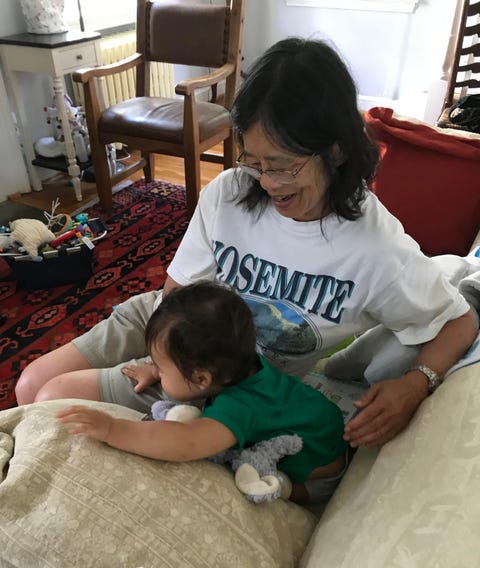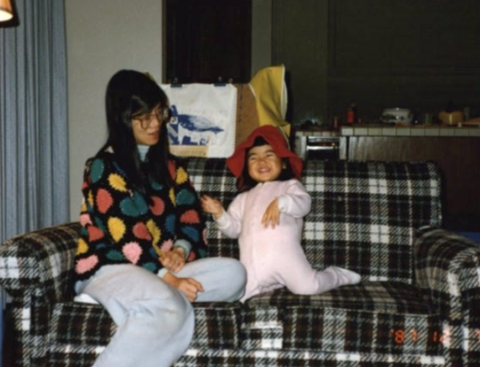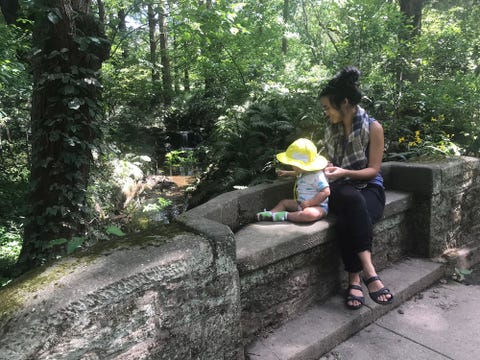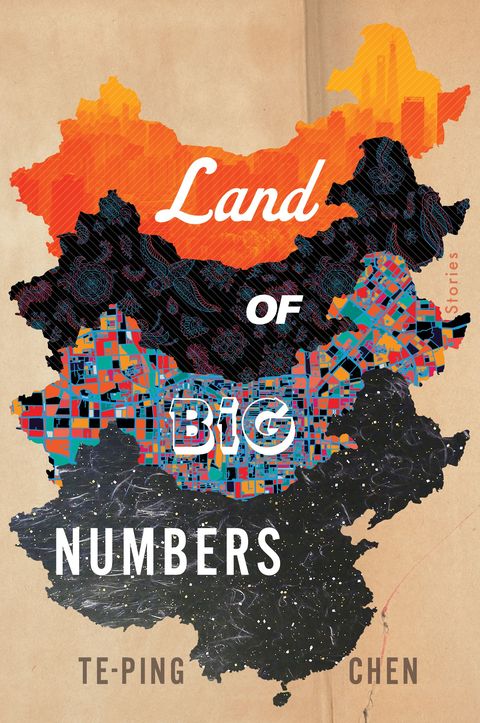I’m sitting upstairs, trying to work, but loud guffaws keep emanating from downstairs.
“I'm sorry,” I say to the person on the other end of the call. “It's my son.
” My Mother is giggling, and my 18-month-old son is emitting the loudest belly laughs you've ever heard.
“A hat!” she says, in a singsong that tickles his funny bone. “A hat!”
The two of them are bosom friends. She’s 72 years old but sits on the floor all day long with him. If it were anyone else, he'd want to trot around, but with her, he’s content to sit in her lap, enthralled with her antics. A plastic bowl becomes a hat. A toy drum is spun in a circle. She hoists him onto a chair and runs her fingers up and down its spindles. “Up!” she says in an incantatory tone, and he shrieks with joy. “Down!”

If someone were to give MacArthur awards for babycare, I would nominate my Mother in an instant. When my son was a newborn, I’d sometimes be weary, or want to wander away and check my email, read a book, or eat a snack. Not so my Mother. When he was an infant, she would sit and bounce him on a yoga ball for hours on end. I’d offer to put on the radio, or stream a movie, but she'd just smile and shake her head and bounce him all afternoon as he drifted in and out of sleep. When he woke, they’d lie on the bed together, and even when he was just a few months old, they would giggle and chatter.
“There's something unreal about it,” my husband once commented wonderingly. “She's indefatigable.”
I didn't recognize this woman. For most of my life, I've regarded my Mother with what you might describe as affectionate impatience: Someone who needed my support for even the simplest, seemingly foolproof tasks. Growing up in Oakland, my childhood was full of love, but also messy around the seams—literally so. My parents had strong hoarding tendencies, and the house was like a Salvador Dalí painting, objects melting into each other, strange items juxtaposed. To-do lists were foreign, as was any sense of time. We didn't own a single clock, except for one alarm clock that sat in the upstairs hallway, a hand-me-down that at some point stopped displaying the correct hour. No one bothered to reset or unplug it, and eventually it fell behind a cabinet, and no one ever picked it up. Cleanliness did seem like godliness: a virtue we could never achieve.
It wasn’t like my Mother was indifferent to the disorder around us, quite the contrary. She longed for the house to be clean, but didn't seem to understand the mechanics that would make it happen. The few times I saw her try to tidy a closet, she’d pull out every item, create even more chaos, then leave it, frustrated, on the floor. Dishes listed, forgotten, in the sink. I’d implore my parents to put things away, and they’d vow to try, but could never remember.

The state of the house weighed on her and all of us. When I was in elementary school, we sometimes drove a neighborhood boy home with us so my Mother could watch him for a few hours. “Back to the junkyard,” he said, the second time we pulled into the garage. My Mother sat there like she'd been slapped. I sat there, hating the child, but also angry with my Mother, too. Why couldn't she get things right?
In my mind, I ticked off all the tasks I would never trust my Mother to do. When she drove anywhere new, she'd get helplessly disoriented and someone would have to go find her. Simple tasks inevitably ended up becoming complicated: Her credit card wasn't working. Her passwords had been lost. She couldn’t find her ID. At some point earlier last year, I realized she was trying to make pasta by dumping it, uncooked, and heating it in a pan with tomato sauce. (My dad loyally said the texture was funny but it tasted fine.)
A parent of three who also worked as a teacher, my Mother won the affections of countless students. She was fearless when it came to strangers and could make friends with anybody—in part, I think, because she was so used to relying on other people for assistance. She assumed the world was trying to help her, and often, it was. She has a kind of naiveté that can be alternately frustrating and charming, and finds every person she meets utterly fascinating. “I met a woman today who was a nurse,” a typical story might run. “For sixteen years, can you believe it? She helped me look for my swim goggles. A nurse! Isn't that interesting?” Or, on another occasion: "Such a nice man helped drive me around the parking lot today so I could find my car. He has a dog. A German shepherd!” Each story is related with wide-eyed delight.
I was pregnant, and for the first time in my life, there'd be someone else I needed to take care of.
I, too, wanted to help her. As I got older, I did my best to fix up the house, sorting through and discarding my parents’ detritus. When our trash got too full, I would make furtive trips around the neighborhood, learning the location of every nearby dumpster by heart. When I went away to college, I’d spend Christmas holidays scrubbing floors and excavating cupboards and vacuuming rooms that hadn't been touched since my last visit, and hours going through bags of their bills and mail—which otherwise could sit in piles for years. I started taking on more of their finances, helping them where I could. It was a vortex of never-ending tasks that consumed me.
Each time, my Mother would be so pleased. “The house looks wonderful,” she'd say, hugging me. “Thank you so much.” Often she'd want to take a photo, to document how lovely it looked. But by my next visit, everything would be in disarray again.
Over the years, tears and frustration and anger—why couldn't things be different?—gave way to acceptance. When my husband and I moved back to the U.S. from China, where we lived for a number of years, we helped my parents purchase a condo near us. My father had been ill, and they needed support. It occurred to me to let them move in with us, but the idea made me shudder. I couldn't imagine living with them and not getting completely sucked into their needs.
Besides, I was pregnant, and for the first time in my life, there'd be someone else I needed to take care of, a helpless creature I'd have to make a priority. My parents expressed a desire to stay with us after our son arrived, but I demurred. I’d have to cook and clean for them and help mediate a dozen miniature trials a day, and I couldn't. “Are you sure? Your mother is really good with babies,” my Father said.
“I'm sure,” I told him. “I can't take care of a newborn and you guys, too.”
Then the pandemic happened. When my husband and I had purchased our house, we kept an eye out for one with a ground-floor bedroom, assuming we’d someday wind up responsible for my parents. It turned out to be useful sooner than we expected.

It's now been a year since they’ve moved in. As a child, I’d idolized my Father in many ways, struck by his never-ending patience with my Mother and his loyalty and dedication to family. But in the time since they've been living with us, to my astonishment, it’s my Mother I've felt a new and growing respect for. She's the one who wakes up at 6 a.m., eager to play with her grandson. She's the one who spends hours at night on the phone with relatives in tricky situations, offering advice and support. When she fractured her knee earlier in the pandemic, we had to beg her to slow down and rest, to put her needs, for once, before my son’s. In these trying months, she's stayed cheerful and steadfast.
Though my Mother can't figure out how to empty a vacuum trap to save her life, she effortlessly intuits what my son most needs at any moment: to see her place a book atop her head like a hat, to be told to wiggle his fingers to make shadows, to hear her repeatedly say the world “bubble” in different tones of comic joy, sending him into spirals of giddy laughter. When she enters a room, he looks at her like she's the Pied Piper and Raffi rolled up in one, riding in on a winged, multicolored elephant to play with him.
Several times a week, my husband and I will look at each other and shake our heads in bemusement. “Witchcraft,” I'll mutter as we watch her avert a toddler meltdown, turning his stormy mood into gales of laughter. “She understands him so well,” my husband said on a recent day. “To be in touch with her inner child like that is just…incredible.”
I nodded. Part of the poignancy in watching her mother my child is catching a glimpse of how she must have been with me and my sisters when we were young, memories we’ve mostly lost by now. In the years since, those relationships have changed and frayed and become more complicated. We’re adults now, after all. But here I am, seeing what a gift she would have been to us as children, understanding for the first time how deeply committed she must have been to our needs.
The pandemic has taught us all many things—about our country, about ourselves. One thing I’ve learned is that you're never done knowing a person, or your parents. I'm still not done getting to know mine.
This story is part of ELLE's Lost and Found: One Year in Quarantine. Click here to read all the stories in this package.

